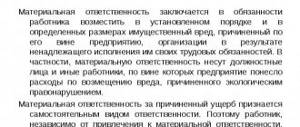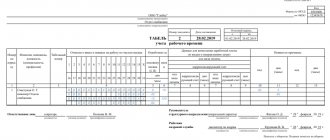Employees of enterprises bear financial responsibility, that is, they undertake to compensate the employer for losses if the damage is caused due to their guilty actions or inaction. Companies have limited financial liability of the employee, that is, the subordinate only compensates for direct actual damage, unless otherwise provided by the employment contract or current legislation. From this article you will learn what is meant by limited financial liability, in what cases it occurs, how an employee is held accountable, and the amount of compensation paid.
What is limited financial liability of an employee?
Important! Limited financial liability of an employee involves compensation by the employee for damage caused to the employer in the amount of actual damage, but not exceeding the limit of salary deductions approved by law.
Limited financial liability of a company employee is said to exist if 2 necessary conditions for its occurrence are met:
- Damage to the employer's property is caused during the performance of the employee's work functions.
- Damage occurs due to careless handling of property or due to negligence.
In some cases, full financial liability occurs (the full list of situations is strictly regulated by Article 243 of the Labor Code of the Russian Federation):
- if the employee intentionally caused damage to the employer (stole, intentionally damaged);
- if the damage was caused due to the subordinate’s failure to fulfill his official duties established by the employment contract.
If the employee did not commit an action (was not inactive), which would result in full financial liability, it is automatically considered that he must bear limited liability. responsibility.
Conditions of occurrence and establishment
- the fact and amount of damage that the employee did this has been documented;
- there is not a single factor that excludes or casts doubt on guilt;
- it has been proven that this was done intentionally (negligently or carelessly).
As a rule, an employee’s limited liability occurs if the employee unintentionally damages or destroys the property entrusted to him, loses financially significant documents or incorrectly prepares them, which “backfires” on the company, say, in the form of a supply failure.
There is, however, one caveat - lost benefits cannot be recovered from the employee , no matter what type of responsibility he bears. This is the difference between the requirements of the Labor Code and civil legislation.
Negligence refers to the option when a person knows what his actions can lead to, understands that they contradict the established rules, but hopes that “it will do.”
For example, a saleswoman at a haberdashery boutique ran to the toilet, leaving the boutique unlocked, thinking that since she was leaving for a short time, nothing could happen in such a short time. At this time, one of the dishonest visitors comes in and takes whatever he likes. Carelessness, on the other hand, consists of not understanding or misunderstanding what unlawful actions can lead to.
In what cases is limited financial liability of an employee applicable?
Important! A closed list of cases in the event of which a subordinate bears limited financial liability is not established at the legislative level, but the law precisely defines the limit of financial liability for some special cases.
Absolutely all employees bear limited financial liability to the employer:
- full-time and freelance,
- workers under a temporary contract and under an unlimited time contract,
- working on a permanent basis or seasonally.
Important! The limited financial liability of an employee is called limited for the reason that damage caused to the employer can be compensated only within the limits of one average monthly salary of the employee, calculated according to the rules from Article 139 of the Labor Code of the Russian Federation.
Typically, limited liability occurs in the following cases:
| Case of limited liability | A comment |
| The employer did not receive the money due to him in full (usually he received more, but this time he received less). | The reason for this was the employee’s dishonest attitude towards his job responsibilities. |
| The employer was forced to suspend production or send workers home. | This was due to employee damage to equipment, creation of an emergency situation and other unlawful actions. |
| The employer incurred the costs of repairing damaged company property. | The property was damaged by an employee who will be held liable. |
| The employer could not fully carry out its activities due to the fact that the employee did not draw up the necessary documentation. | Or drafted the papers improperly. |
| The employer suffered actual direct damage due to the loss of critical documents. | We are talking about papers that cannot be quickly recovered. |
| The employer suffered losses because material assets transferred to the employee to perform his job functions were damaged. | The employee damaged property through negligence or inattention. |
| The employer had to pay a fine due to the employee’s guilty actions. | A fine may be paid for the employee’s unlawful actions or imposed on the employer due to the employee’s fault. |
What sizes is it limited to?
When determining the amount of limited liability, it is necessary to take into account the employee’s average monthly earnings. It is determined for the last 12 months that preceded the occurrence of damage. If the employee has not worked for a year in the company, then the entire period of work, not exceeding a year, will be included in the calculations.
It is important to take into account that the limits of limited liability are established precisely in the month of receipt of earnings, and not as the amount of wages accrued in the month of deduction of damage.
According to the provisions of Art. 139 of the Labor Code, to calculate average earnings you need to take into account:
- Employee salary.
- Allowances and surcharges.
- Awards.
- Compensation.
- Rewards and other payments according to the remuneration system.
The damage itself is determined on the basis of average market prices for property that apply in the region where the company operates. Its determination may also be based on accounting documentation, which indicates the cost of fixed assets (but it must be adjusted to take into account depreciation). For example, the amount of damage can be determined based on the cost of the same property that the employer is to purchase, and on the basis of an invoice for equipment repair work that was received from a service organization. The calculated amount of damage must have its documentary evidence, otherwise the employee will be able to challenge it in court.
No surcharges are applied to the calculated amount of damage, and it is not indexed to inflation. The only thing is that the employer can revise it downwards at his own discretion.
After the average earnings are calculated, damages are recovered within its limits. For example, the amount of damage was 100 thousand rubles. The average employee's earnings over the past 12 months amounted to 26 thousand rubles. As compensation for damage caused, the employer can recover no more than 26 thousand rubles.
If, for example, an employee lost a tool worth 2,000 rubles, and his average earnings were 25,000 rubles, then it turns out that he will have to compensate the employer for damages in full, although in fact the employer will comply in this case with the requirement to apply limited liability to employees.
However, the deduction itself cannot always be made at once. It must be carried out in accordance with Art. 138 Labor Code, i.e. in the amount of no more than 20% of the salary. It should be taken into account that other deductions may be made from the employee’s salary (for example, for alimony).
The amount of damage that is subject to compensation by the employee may be reduced by the organization authorized to resolve labor disputes, taking into account the employee’s guilt, his financial situation and other circumstances on the basis of Part 1 of Art. 250 TK. Such a committee can function in large enterprises on the basis of a trade union. The employee can also apply to the court to protect his interests, and the court can revise the amount of damage to a lesser extent.
The procedure for bringing an employee to limited financial liability
In order to legally withhold money from an employee for losses caused to the company, the following conditions must be met:
- The employer must make a written order.
- The order must be drawn up no later than one month after the date on which the exact amount of damage caused to the company was determined.
- Withholding from an employee should not be made in an amount exceeding one average monthly salary.
If the employee cannot pay off the debt immediately, he asks the employer to allow him to pay in installments. Then an obligation to compensate for the damage is drawn up, indicating the amount of the debt and the timing of its payment.
If the employee who wrote the obligation leaves work and stops paying money to the manager, the second has the right to file a claim in court. If a subordinate has repaid a debt, this does not relieve him of disciplinary liability. And if an offense is discovered in his actions, he may be held administratively or even criminally liable.
What it is?
This is the employee’s obligation to compensate for direct actual damage caused to the company (Article 233 of the Labor Code). It is measured by average monthly earnings (Article 241 of the Labor Code), in contrast to full earnings - where they are required based on the amount of damage caused.
The employer, along with providing the employee with a workplace, proper working conditions and all the necessary consumables (as well as wages, of course), can demand a natural return - careful treatment of his property.
And if it is established that the employee caused him some damage, or that corporate property was damaged in one way or another, reclaim it from him in the proper amount.
True, this amount is not limited only by the will of the employer; the law provides for serious limits for it. If a businessman violates this rule, then the damages will not be recovered from the employee, but he himself may be held liable... So, the limited financial liability of the employee is within the limits of the Civil Code of the Russian Federation.
Limits of liability
As already mentioned, the amount of compensation withheld from the employee cannot exceed his average monthly income (Article 241 of the Labor Code). It is calculated on the basis of Art. 139 of the Labor Code and Decree of the Government of the Russian Federation No. 922 of December 24, 2007, which covers the criteria for calculating wages.
If full liability is not provided, and the amount of damage is more than the average monthly salary, then the average monthly earnings limit cannot be exceeded.
The rest is written off as business losses of the company.
Legislative acts on the topic (Labor Code of the Russian Federation)
| Art. 241 Labor Code of the Russian Federation | On limited financial liability of employees |
| Art. 243 Labor Code of the Russian Federation | On the full financial liability of employees |
| Art. 248 Labor Code of the Russian Federation | Sequence of actions when bringing an employee to limited financial liability |
| part 3 art. 196 Code of Civil Procedure of the Russian Federation | Cases when a court can hold a company employee to full financial liability, despite the fact that the employer (plaintiff) declared to hold him to limited financial liability |
Employer's procedure
- determine the amount of damage caused;
- How guilty is the employee and is he guilty at all?
- a commission is created to establish the full picture of the damage;
- the employer informs the employee about the results of the inspection and requests an explanation (the employee has the right not to give the latter);
- an order to recover the amount of damage from the employee is issued and registered, the employee familiarizes himself with the order
The employer must demand an explanation from the employee who committed the offence. True, he may refuse to give them - this is his right, which cannot be violated.
There are no clear time limits for giving them explanations for their actions, but since any financial liability always arises as a result of at least a disciplinary violation, the period provided for by law in this case is usually set at two working days.
The employer can recover the amount intended for compensation on the basis of a specially issued order. This amount is withheld from the wages of the offender, but not at a time, but in parts, over several months, and each of the “tranches” should not exceed 20% of the monthly income (Article 138 of the Labor Code).
The obligation to pay for damage caused cannot in itself serve as a prohibition for terminating an employment contract . But dismissal, in turn, does not cancel this obligation.
The employer may also exercise its right not to recover damages from the employee (Article 22 of the Labor Code).
If you need more legislative information, regulations and orders are at your disposal, as well as our analysis of the laws on this topic. In addition you can find:
- instructions for collection and reasons for this;
- detailed description of inventory;
- information about the appointment, change and dismissal of the person in charge;
- as well as a log of contracts.
Example 1
Office manager Rumyantseva broke the copy machine, trying to “repair” it herself due to a problem that had arisen. She agreed with the claims presented to her, as a result of which the amount of 8 thousand rubles was collected from her to pay for the purchase of a new device.
Example 2
Due to the fault of Magras LLC locksmith Pyanov, the entire lower floor of the office building was flooded. The total amount of damage, taking into account wear and tear, amounted to 200,000 rubles. An agreement on full financial liability was not concluded with Pyanov.
The plumber admitted his guilt, agreeing to pay damages in the amount of his earnings (which amount to 30,000 rubles). Thus, the company will have to write off the remaining one hundred and seventy thousand as losses.
Common mistakes
Error: The employer demands absolute compensation for losses from an employee who damaged company property during the production process.
Comment: If damage is caused during the performance of work duties, the employee bears limited financial liability (within the maximum possible deductions, but not more than the damage actually caused).
Error: An employer enters into a separate limited liability agreement with a newly hired employee.
Comment: If the employment relationship is formalized in accordance with the requirements of the law, no additional agreements are required - cases where the employee bears full financial responsibility are established by the List of the Ministry of Labor, and in other cases the law obliges the employee to be responsible for the employer’s losses arising through his fault.
Which workers usually carry it?
So, representatives of which professions swear. responsibility? The procedure for imposing sanctions on the designated basis is permitted for employees with access to material assets. For example, for damage or loss of goods, lack of money for the following categories:
- sellers and cashiers;
- forwarding drivers;
- operators of credit institutions;
- waiters and bartenders;
- other representatives of paid services to the population.
limited
For employees using the employer's equipment or vehicles, deduction can be made:
- for damage to equipment;
- damage to computer or audio-video equipment;
- repair of a vehicle involved in an accident, etc.
If an authorized person has access to state secrets, he may be held liable for its disclosure.
This category includes certain types of work related to:
- with the civil service;
- work in some law enforcement agencies;
- work in the military department.
Now it is clear within what professions one can bear such responsibility.
where products in the form of raw materials, goods or food are stored are subject to penalties
Such cases are not uncommon in agriculture. Persons involved in livestock farming may be subject to liability if livestock dies due to the fault of a worker or official authorized to care for it.
Or in the event of the destruction of part of the crop in the fields and in vegetable stores, due to the negligence of those in charge.
Resolution of the Ministry of Labor No. 85 defines a list of persons who are charged only with full financial responsibility, without limitation by the amount of the average monthly salary.
Answers to common questions
Question No. 1: Can minor employees bear full financial liability to the employer?
Answer: No, according to the law, only limited financial liability of the employee applies to minors. Even if adult employees bear full financial liability in similar cases, minors may incur only limited liability.
Question No. 2: When does full financial responsibility begin for an employee?
Answer: Only employees whose positions are included in a special List of the Ministry of Labor, approved by Resolution of the Ministry of Labor No. 85 dated December 31, 2002, bear full financial responsibility.
Evaluate the quality of the article. Your opinion is important to us:
Writing a special agreement
An agreement is a basic document on the basis of the provisions of which all types of assignments determined at its conclusion by the parties are executed. The employer's claims cannot go beyond the established provisions. Also, the employee does not have the right to be released from the liability established by the contract.
Therefore, in the basic documentation, which are contracts and functional responsibilities of the employee, certain provisions must be written down, which impose on him the corresponding responsibilities for the safety of the employer’s property. Subsequently, on their basis, a package of documentation for issuing a penalty is formed.
If provisions on financial liability are not included in the employment contract, it is necessary to draw up an additional agreement or annex to the employment contract, which establishes the possibility of imposing limited liability.
Here you need to specify:
- details of the employment contract;
- information about the parties who entered into it;
- reasons for the onset of liability (read about the conditions and grounds for the onset of material liability here);
- types of activities for which responsibility is charged;
- property placed at the disposal of the employee.
After drawing up the main part, the parties certify the document with handwritten signatures with a transcript of the surname. The employer affixes the document with the seal of the organization.
ATTENTION: The additional agreement is concluded only between persons who are counterparties to the employment contract.
If the relevant provisions are included in the employment contract, then there is no need to draw up a separate agreement or annex on the precedent of limited participation of the guilty employee in compensation for losses.
Upholding their rights in case of violations
Financially responsible employees have the right to demand from the organization’s management conditions that promote the safety of entrusted property.
They also have the right to receive all information regarding the entrusted values. In particular, employees have the right to participate in inventory checks conducted by management.
If the rights of financially responsible persons were violated by the employer, which resulted in failures in the safety of the entrusted property, then management cannot impose penalties. If these legal norms are violated by the employer, the employee has the right to file a complaint or claim:
- to the State Labor Inspectorate;
- the prosecutor's office;
- civil or arbitration court.
Based on an inspection initiated by the designated authorities, the unlawfully received penalty may be cancelled.
Responsibilities of employees according to the rules
Responsibilities stem from those standards established by the employment contract and functional responsibilities. Therefore, when appointing a financially responsible person, it is necessary to find out whether the requirement for the safety of damaged or lost property was included in the basic provisions on the employee’s powers.
To do this, it is obviously necessary to introduce special requirements that reflect the nature of the work performed by the employee.
These may include:
- treat the entrusted property with care;
- monitor the safety of furniture, equipment or computer equipment;
- maintaining technical records and reporting;
- conducting an inventory of property on the balance sheet;
- notifying management of the possibility of risk of damage;
- the need to take other measures to preserve entrusted valuables.
Such duties, imposed by an official order of the manager, require the transfer of entrusted property by an acceptance certificate. It specifies a list of items for which liability may arise.









